
The digital age has transformed how we go about our daily lives. Smartphones, tablets and personal computers have become ubiquitous in society, when it was impossible to imagine such technological capabilities at our fingertips a generation or two ago.
With a near-endless supply of content online, and the ability to connect with people in different ways all over the world (including in the metaverse), users have every reason to spend hours tuning in to their devices. In the U.S., the rate of mobile usage continues to grow, with Insider Intelligence reporting that 253.3 million adults regularly use smartphones in 2023.
While a little more time online is no bad thing, pediatric research from University College London links excessive screen time usage among adolescents to physical and mental health problems by adulthood. However, some parental groups argue that internet use can improve a child’s emotional intelligence and well-being.
Whether you’re always online or just a casual browser, there can be no doubting the impact of internet culture on today’s world. But in which countries are screen times the highest and lowest among residents? Electronics Hub has analyzed trends in 45 developed nations to find out.
How We Conducted This Study
We analyzed DataReportal’s Digital 2023: Global Overview Report to find country-level data for screen time, with information provided from a range of sources, including Semrush and SimilarWeb.
We then looked at sleep patterns data from Sleep Cycle to find average sleep times for residents in each country, allowing us to calculate the percentage of awake hours relative to screen time for each category of device.
Key Findings
- South Africans spend almost three-fifths (58.2%) of their day in front of a screen — the most of any nation.
- Filipinos spend around a third (32.5%) of their day using their smartphones, followed by Brazil (32.4%) and South Africa (31.5%).
- PC users in South Africa are online for more than a quarter (26.7%) of the time they are awake.
- Saudi Arabians are the most prolific players spending 11.5% of their day gaming.
- Japan has the lowest screen time of any major nation, with residents spending just 21.7% of their day on their devices.
South Americans Spend More Than Half Their Day Online
We only have so many hours in the day, and how you choose to use them is the key to a happy life. According to research in the Economist’s 1843 magazine, the average person is awake between 16.5 and 17.5 hours per day (excluding sleep). Yet when it comes to screen time, our research shows that the world uses around 40% of their day — 6 hrs 37 mins to be precise, on a computer or mobile device.
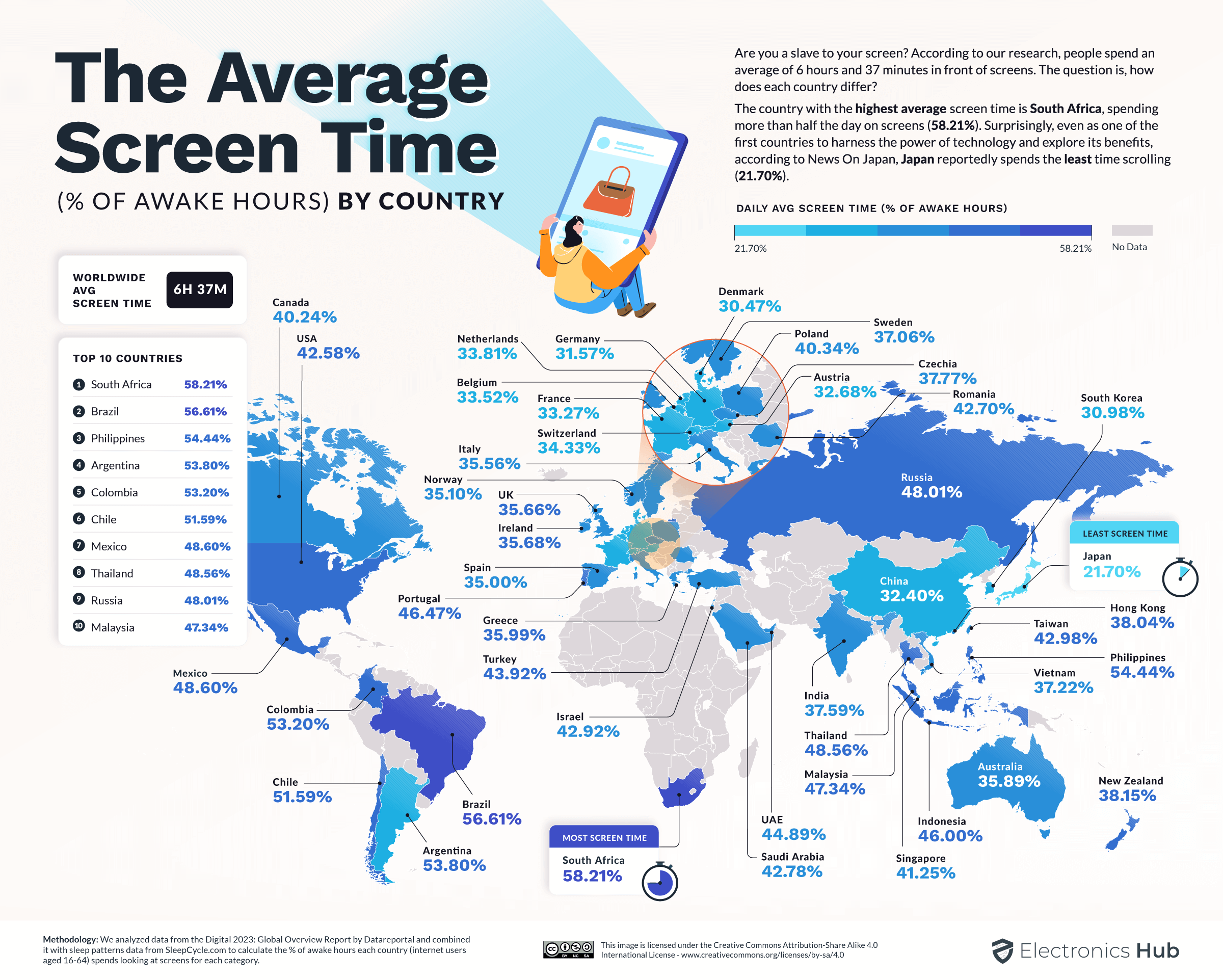
Click here to see the image in full size
Of the 45 nations we looked at, residents of South Africa have the highest screen time of any nation, using almost three-fifths (58.2%) of their time awake using the computer or a smartphone. Excessive screen time is a cause for concern among the country’s public health researchers, with a study by the International Journal of Environmental Research and Public Health finding that 67% of preschool-age children in affluent households exceed screen time guidelines.
Residents in four of South America’s major countries spend more than half of their day looking at screens, with Brazil’s inhabitants spending 56.6% of their time awake using devices — more than those in Argentina (53.8%), Colombia (53.2%) and Chile (51.6%). Excessive screen time also disproportionately affects adolescents, with a study in Brazil’s Jornal de Pediatria revealing that 70% of young people aged between 10 and 19 spend more than two hours a day in front of a screen.
Despite Japan’s love affair with all things technological, its residents have the lowest screen-time rates in the world, with users allocating just 21.7% of their time to look at their devices. In 2020, Kagawa Prefecture became the first Japanese region to legally limit screen time, passing an ordinance to tackle rising video game addiction.
Filipinos Spend One-Third of Their Day Using Their Phones
While mobile telephones have been around since the 1970s, and ‘smartphones’ have been in existence since the early 1990s, Apple’s release of the iPhone changed the world forever. Its revolutionary design put the internet in everyone’s pockets, paving the way for social media and software apps to become so prevalent in people’s lives. There are now more than six billion smartphones now in the hands of users worldwide, according to Statista.
But of all the smartphone-using nations, where can you find the most active users? Our research shows that residents of the Philippines spend almost a third (32.5%) of their day using their smartphones. Filipinos are the most enthusiastic mobile users in Asia, with a Telenor survey revealing that it has the continent’s highest rate of digital dependence at 29%. The Philippines has around 69 million smartphone users — among the most in the world, according to markets data by Newzoo.
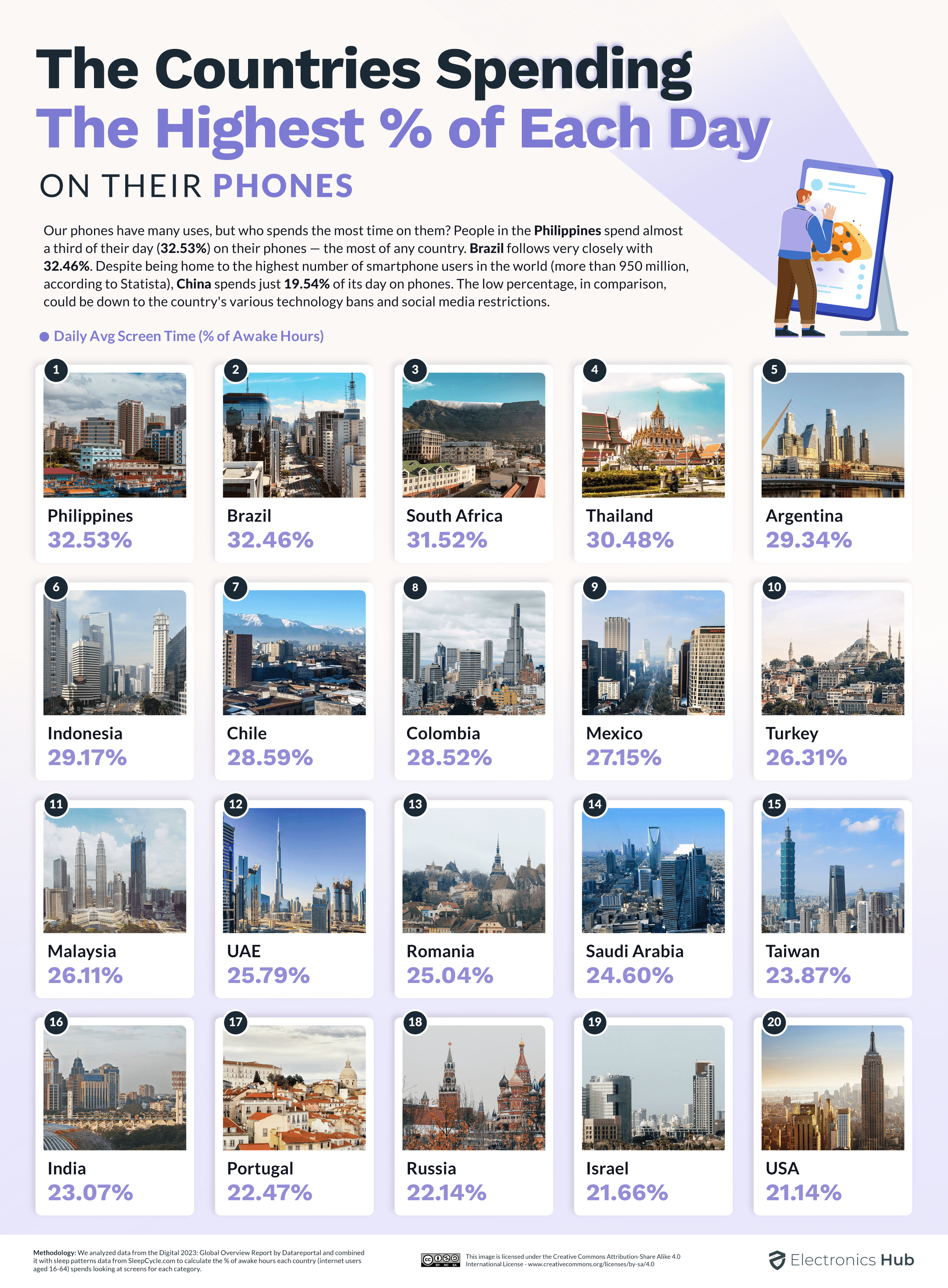
Click here to see the image in full size
On the other side of the world, residents of Brazil can rival Filipinos for screen time (32.5% of waking hours). A report from App Annie found that Brazil’s smartphone usage jumped by 45% between 2019 and 2021. One possible explanation for this is the rise in popularity of online streaming services, with data revealing that 64% of Brazilian smartphone users are subscribed to services like Netflix, Apple+ or Amazon’s Prime Video.
Despite owning the most smartphones of anywhere in the world, China’s screen time statistics are significantly lower than most major nations, with users spending just 19.5% of their day using mobile devices. The Chinese government invested more than ¥400 billion ($59.4 billion) into 5G technology and infrastructure, but smartphone sales in the country declined by 14.7% in 2022 — marking the end of a decade-long mobile communications boom in China.
People in Russia and Colombia Have the Highest Screen Time Rates for PCs
With so much of the world’s focus on the technological capabilities of smartphones, it’s easy to overlook the importance of personal computers in our daily lives. While Apple and Microsoft competed for superiority in the market during the 1980s, PC usage surged in the U.S. from 15% to 35% between 1990 and 1997, according to BLS data. By 2019, almost half of households (47%) worldwide owned a computer.
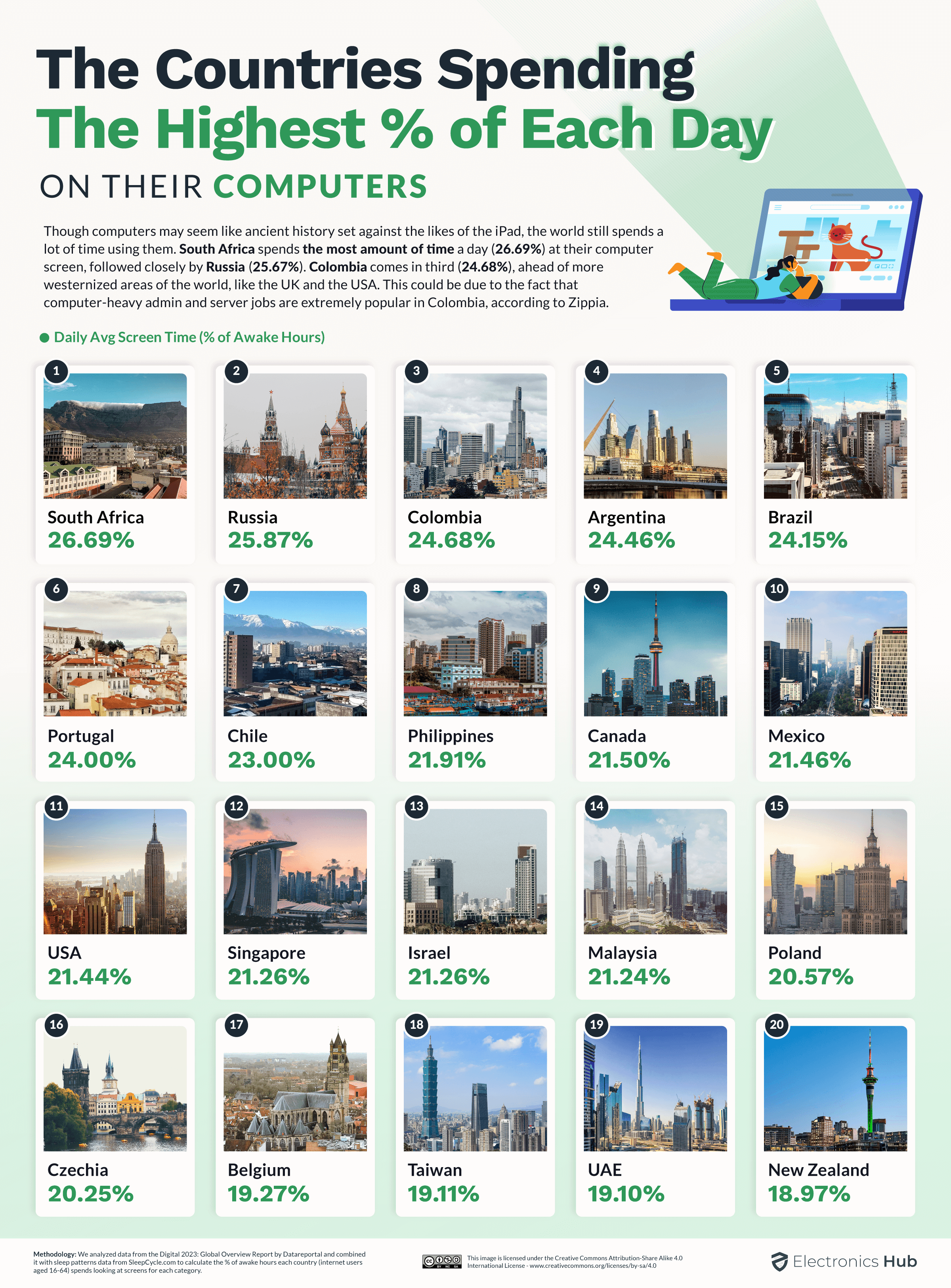
Click here to see the image in full size
While PCs are still integral in people’s lives, which countries use them the most and least? Our research shows that South Africans (26.7%) spend the most time at their computer screens, closely followed by Russians, who allocate 25.9% of their day to it. Russia has struggled to close its country’s digital divide, with computer and internet access significantly higher in its major population centers than rural areas.
In third is Colombia, which leads the South American nations with screen time of 24.7%. Colombia is the fourth-largest IT market in Latin America, supporting an $8.2 billion tech economy. However, just 40% of households own a PC, laptop or tablet in the country, showing that the country has untapped digital potential.
South Africans Spend One-Fifth of Their Time Browsing Social Media
From MySpace Tom to viral TikTok dances, social media has come a long way in the last 20 years. It has made Facebook’s founder Mark Zuckerberg one of the world’s richest men and has influenced the sphere of global politics. DataReportal’s 2023 report shows that 4.76 billion people are now active on social media — around 59% of the world’s population. But which countries have the most active users?
Our analysis shows that users in South Africa have the most screen time, with 22.5% of their days dedicated to scrolling social media. The growth of internet usage in the country has fuelled a digitally-active generation, with more than half of the country’s population now active online. Statista data shows that the majority (56.5%) of the country’s Facebook users are aged between 18 and 35. South Africans are also upbeat about its impact, with GWI’s insight showing that 38% of consumers believe it has a positive impact on society.
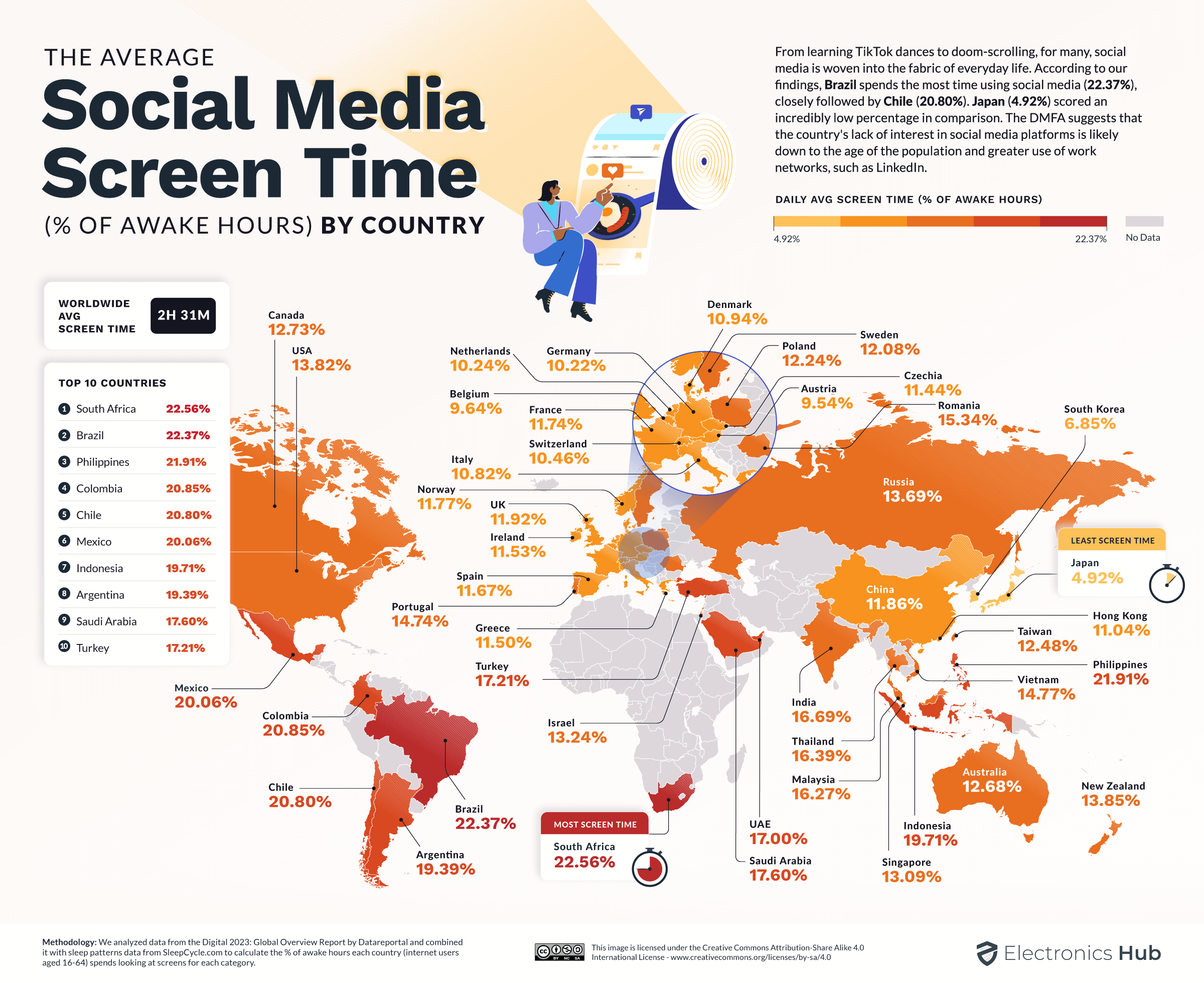
Click here to see the image in full size
By contrast, residents of Japan (4.9%) spend just a fraction of their day browsing social media. While this may seem surprising, Digital Marketing for Asia points out that Japan’s comparatively low social media penetration rate (65%) can be attributed to its aging population. Western social media networks like Facebook and Twitter have struggled to gain influence in the country as their posting culture conflicts with Japanese discretion — thus peer-to-peer platform LINE maintains its stronghold as the country’s most popular social media app.
Saudi Arabia and Thailand Have the Most Active Gamers
Let’s face it — video games can be addictive. Whichever console or game franchise you love the most, there is always that temptation to play ‘one more game.’ During the Covid-19 pandemic, screen time for video games surged, with Nintendo’s Animal Crossing: New Horizons providing a calming distraction for millions of gamers during 2020. During this time, the World Health Organization set out specific guidelines to prevent excessive screen use and encourage healthy behaviors during prolonged lockdowns.
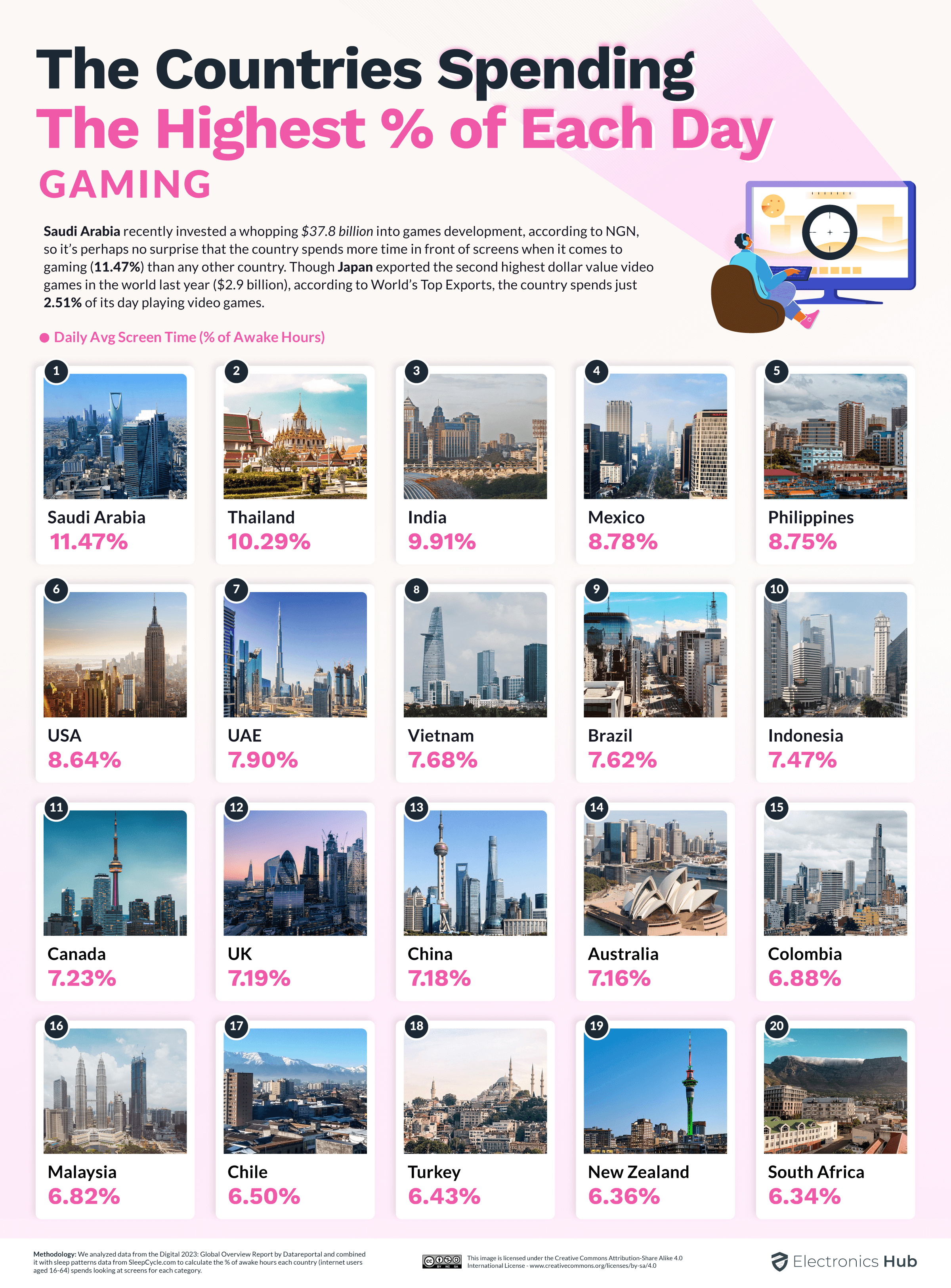
Click here to see the image in full size
Post-pandemic, our research shows that Saudi Arabia (11.5%) and Thailand (10.3%) have the highest screen-time rates for video games in the world. Saudi Arabia, in particular, has embraced gaming and seeks to become a hub for esports, with officials in the country claiming that 89% of the population actively play. Thailand is home to one of Asia’s largest markets for video games, with 250 million players across the country.
Where to Draw the Line on Screen Time
The online world is ever-changing, with new content and trends always on-hand to occupy our attention. As a society, we are online now more than ever — with DataReportal’s research indicating that 64% of the world’s population actively uses the internet. We have compiled all of our research on average screen times around the world into a handy interactive table which can be viewed below, so you can see how your country ranks when it comes to spending time online.
How much screen time is ‘too much’? A Pew Research Center survey shows that 85% of people across 18 advanced economies are using their devices now more than ever, and the Covid-19 pandemic has played a major role in this. A systematic review of screen time usage by the Lancet showed increases for people of all ages, with adults spending an extra hour per day.
While there is clear advice and guidelines on screen time for children from the World Health Organization, experts remain divided on the appropriateness of device usage for adults. Yalda T. Uhls, a professor of psychology at UCLA, argues instead that the debate should focus on the type of content we consume online rather than how much screen time we spend on it.
However, creating a healthy balance for screen time can be beneficial, as a person might look after their physical and mental well-being for a healthy lifestyle. Some health experts recommend a two-hour daily limit for screen time, including video games. Whether you’re scrolling through social media, using your favorite phone app or sitting through a video game session, be mindful of the time you spend online.
The Method Behind The Study
To find out which countries spend the most time looking at screens online, we dug into the Digital 2023: Global Overview Report by DataReportal. This is a global report into digital trends, including country-level data for screen time for adults aged 16-64. Here, the latest digital trends are discussed using country-level data grouped from various sources.
We then looked at sleep patterns data from Sleep Cycle (data as of 10/02/2023) that reveals the average number of hours residents from each country sleep for. This allowed us to calculate the percentage of awake hours spent looking at screens for each category.
Credit : Source Post






